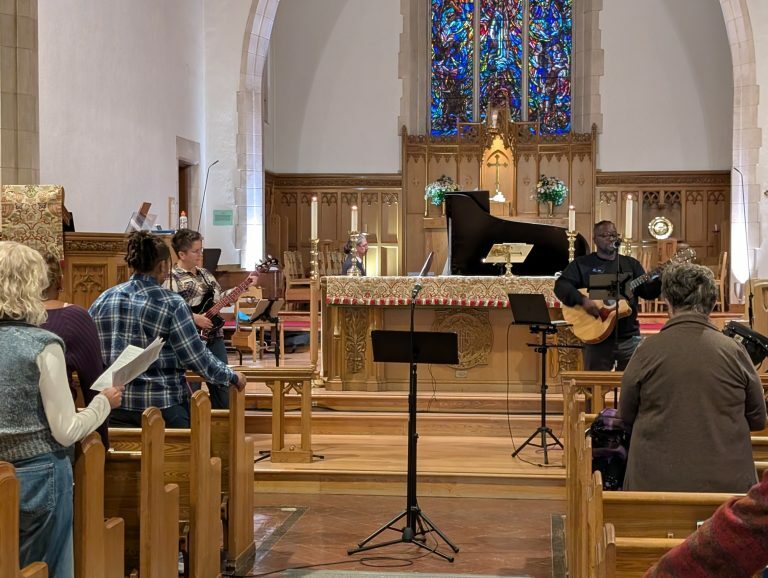
(original article in The Ottawa Churches Chronicle found here.)
Visiting Trinity Anglican Church
Anglicanism encompasses a rich diversity of liturgical expression. My visit to Trinity Anglican Church in Old Ottawa South on All Saints Sunday served as a good example of this. On November 2, I attended Trinity’s 4:00 pm service — a contemporary liturgy featuring praise and worship music, as well as opportunities to connect with others in the pews in a way that made it clear why this service is entitled “Connect.” This is one of two Sunday liturgies at Trinity Anglican Church, with the 10:00 am service a more traditional experience.

Reverend Mark Whittall, a smiling and friendly presence, introduced himself to me in the minutes before the service was set to start. He was equally intentional in greeting everyone in the pews. I found him to be gentle and reassuring — something that I think is so welcome for a first-time visitor to any church, especially when the liturgical form may be new to the guest. He shared with me that his congregation is set to celebrate the hundredth anniversary of the Neo-Gothic church in 2026. The current church on this site opened on April 4, 1926.
Looking around me, the 30 or so people in the pews included several from the Millennial cohort — including myself — and some from Gen X, too. Attendance leaned towards the younger side. Paul Mugarura and Evelyn Mugarura led the service’s music ministry, serving both as cantors and guitarists, elevating the worship experience. They opened with the fast-paced, high energy song “That’s Who I Praise” by contemporary Christian songwriter Brandon Lake. This was followed by a second song that is equally a staple of Christian radio, notably “Firm Foundation” by the worship ensemble Maverick City Music. And after Holy Communion, the lively song “Praise” by Elevation Worship spoke of keeping faith in every place and life circumstance:
I’ll praise in the valley
Praise on the mountain
I’ll praise when I’m sure
Praise when I’m doubting
I’ll praise in the silence,
Praise through the trials
The Lord is my shepherd
He walks right beside me.
Exuding confidence and excitement in our faith is often far easier when at the top of the mountain. But we know that Jesus walked through the valleys, of which there are many, some dark and deep, in our own lives. Often it’s in those valleys and at those depths that we seek out the church, perhaps more so than when we’re comfortable and preoccupied with the temporal victories of life. I remind myself that I can’t fully know where others in the pews around me have been and what draws them to church, what keeps them holding firmly or just tentatively to their faith in the transcendent.

The service included a reading of Psalm 24 and Luke 6, Jesus’ Sermon on the Plain. The lectors at this liturgy were extraordinary in their delivery. They made the readings come alive. It’s in this Gospel reading that Jesus speaks some of his most often quoted, formative lines: “Be merciful, just as your Father is merciful” and “love your enemies; do good to those who hate you; bless those who curse; pray for those who mistreat you.”
Reverend Whittall offered his reflection from a simple music stand, and at the same level as the congregation. He is a highly engaging, effective orator. He spoke of Jesus as a great teacher who has the capacity to draw us in by surprising us, or by sharing the most memorable stories or by starting off with a statement that everyone can agree with, only to take that thought one rather big step further. First Jesus gets everyone’s attention and agreement, before telling them something new and unexpected. Jesus begins with the Golden Rule, a universal ethic of empathy, fairness, and care for the other. This would have been familiar to his Jewish followers. “It’s an ethic of reciprocity,” Reverend Whittall observed. But what happens when people don’t reciprocate our kindness? That’s at the heart of what Jesus is addressing in this parable and it’s one of His most challenging teachings.
Reciprocity isn’t a bad thing, Reverend Whittall noted, but Jesus is calling us to go beyond. “Jesus is calling us to something more, and that something more is grace. Grace is love that is freely given, with no expectation in return. Pure gift, unconditional love,” he added.

One of the novelties of the service, at least for me, was a period of shared reflection and conversation after the sermon. The faithful in the pews turned to each other and for a few minutes listened to each other as they shared how the Gospel spoke to them. In keeping with this service’s emphasis on connection, during the Sign of Peace, the faithful didn’t just greet those nearest to them in the pews, but people circulated throughout the nave, offering a handshake and a few friendly words to everyone.
November 2 was the first Sunday of the time change. As such, the service began with the sun shining in through the stained glass and it ended with a darkened world beyond the walls.